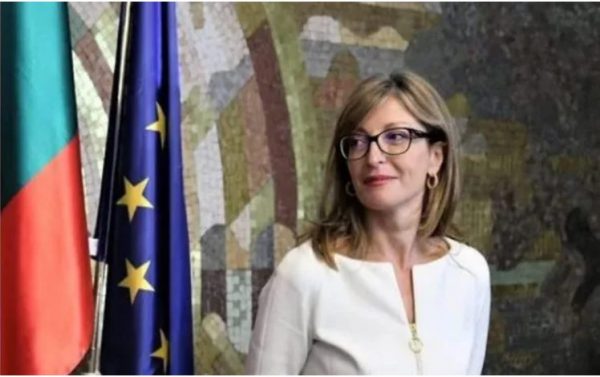Bulgaria brought enlargement into the focus of the European Union, but it proved impossible for it, at this stage, to approve North Macedonia’s EU negotiating framework. Therefore Skopje and Sofia need to calm down to find a solution, Bulgarian Foreign Minister Ekaterina Zaharieva said in an interview with Sofia-based newspaper ‘Trud’.
“Once the situation calms down, North Macedonia will see that Bulgaria was never its enemy, but on the contrary, remains an honest friend. Friends point out problems and find ways to solve them together,” Zaharieva stressed.
According to her, the Bulgarian EU Presidency made enlargement a top priority as the European prospects of Western Balkan countries, including North Macedonia, are the driving force behind implementation of reforms and true reconciliation between countries in the region.
“This was the logical choice as a neighbor and in Bulgaria’s best national interest. So, we didn’t make a mistake. Regarding the current situation, it seems that my fellow politicians (not just the government) in North Macedonia never understood how the European Union functions. They didn’t react on time to Bulgaria’s warnings. We kept trying to explain in a friendly manner that treaty provisions must be implemented and that no one can force Bulgaria to back away and forget its position. We issued warnings for at least a year and a half, before adopting conclusions on enlargement in March 2020. The position of the Bulgarian Parliament was endorsed a year prior to this event, and even before that we sent signals and constantly called on treaty implementation. Failure to honor this commitment causes Bulgaria to lose trust in their willingness to implementing provisions,” Zaharaieva added.
Bulgaria’s top diplomat underlined that relations between Skopje and Sofia can be amended by restoring trust.
“This is what we’re working on. We never stopped, never gave up on this case. We’re setting up a clear agenda for treaty implementation in order to make up for lost time. There are practical responsibilities that both sides should accept, there has to be clear commitment to making sure activities of the joint commission on historical and education issues aren’t blocked by one side. Hopefully, trust will be restored once we renew commitment,” the Foreign Minister said.
Regarding EU enlargement during the Portuguese EU Presidency, Zaharieva said that Lisbon holds the position that the process should not be rushed, something that she personally agrees with because there’s no point “holding meetings every month if no progress is achieved regarding issues that are up for discussion.”
“Bulgaria isn’t North Macedonia’s enemy. It’s in the best interest of its citizens that North Macedonia realizes this as quickly as possible. I don’t expect any pressure from our Portuguese friends and colleagues, nor from anyone else. We must work together,” Zaharieva noted.
According to her, it’s wrong to think that a change in Bulgarian leadership after March elections will cause Sofia to soften its position towards North Macedonia and give up on some of its demands.
She also pointed out that a crucial principle of the EU enlargement process is resolution of open disputes, not just with member states, but also with neighbors.
“There are numerous bad examples of unresolved bilateral issues which have made member states act with extreme caution towards enlargement. Bulgaria continues to be a friend of all Balkan countries, including North Macedonia, and support their European perspectives. However, support is not unconditional,” the FM told ‘Trud’.















